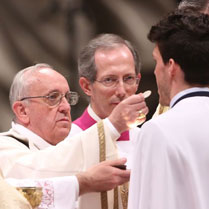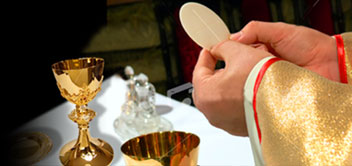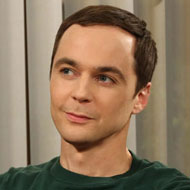Bishops sometimes wrestle with the dilemma of publicly refusing communion to high-profile non-Catholics or Catholics who have caused scandal and not repented.
Thankfully, that’s not an issue for country priests! The closest I’d get to that is clarifying who may make a sacramental communion at weddings.
I’ve adopted the rule that if the matter is addressed in the booklet I won’t speak to it. If it is not mentioned in the booklet, or if there is no booklet, then I will speak to the matter before the Ecce Agnes Dei. It shouldn’t have an overly high profile. The rite of communion is not the time for lengthy catechesis on conscience and canonical discipline. Hence my either-or approach: either an oral statement or a printed statement, but not both.
Here are two recent examples of the sort of statements I mean:
HOLY COMMUNION
Reception of the Eucharist is the greatest expression Christians have of communion in and with Christ. For Catholics, it is also an expression of communion with Christ’s Church, which is embodied in communion with Pope Francis.
Catholics in communion with the Church are invited to approach the altar. Other guests are welcome to join the communion procession with their arms crossed across their chest so that they may receive a blessing.
HOLY COMMUNION
In accord with the practice of the Catholic Church, Catholics who are ready and disposed to receive Holy Communion may approach to receive the Most Blessed Sacrament.
Non-Catholics and Catholics not prepared to receive communion may approach for a blessing, the request for which is made by crossing your arms across your chest.
To be honest, I’m not very happy with them. Saying too little, I think, can be more damaging than saying nothing at all. A bald statement of the rules, without elaborating on the rationale, can leave the impression that the Church’s exclusive rules on communion are in direct contradiction with our Lord’s inclusive ministry to sinners.
I’ve been contemplating a scriptural quote:
“Whoever eats the bread or drinks the cup of the Lord in an unworthy manner will be guilty of profaning the body and blood of the Lord. Let a man examine himself, and so eat of the bread and drink the cup. For any one who eats and drinks without discerning the body eats and drinks judgement upon himself.” (1 Cor 11:27-29)
But maybe a quote from Pope Francis lends itself. He speaks, after all, with the authority of someone whom the world has decided is inclusive and Christ-like. So it’s not just the hoary old young priest being miserly.
David had been an adulterer and had ordered a murder, and nonetheless we venerate him as a saint because he had the courage to say: ‘I have sinned.’ He humbled himself before God. One can commit enormous mistakes, but one can also acknowledge them, change one’s life and make reparation for what one has done.
It is true that among parishioners there are persons who have killed not only intellectually or physically but indirectly, with improper management of capital, paying unjust wages. There are members of charitable organizations who do not pay their employees what they deserve, or make them work off the books. [. . .] With some of them we know their whole résumé, we know that they pass themselves off as Catholics but practice indecent behaviors of which they do not repent.
For this reason, on some occasions I do not give communion, I stay back and let the assistants do it, because I do not want these persons to approach me for a photo. One may also deny communion to a known sinner who has not repented, but it is very difficult to prove these things.
Receiving communion means receiving the body of the Lord, with the awareness of forming a community. But if a man, rather than uniting the people of God, has devastated the lives of many persons, he cannot receive communion, it would be a total contradiction. Such cases of spiritual hypocrisy present themselves in many who take refuge in the Church and do not live according to the justice that God preaches. And they do not demonstrate repentance. This is what we commonly call leading a double life.
Really, it’s much too long, and the context is different. It’s actually an explanation for the Pope’s habit of often “sitting out” the communion rite.
But it does provide a good model, I think, for a shorter statement on communion which I can compose for future weddings and the like. It avoids jargon, and sounds reasonable. I like it.
Incidentally, I think holy communion is one instance in which the Church does need to be exclusive rather than inclusive. But such instances are exceedingly rare. A beautiful post from Joanne K. McPortland’s Egregious Twaddle blog provides good context. Here’s a pertinent warning:
We act—I act—as though the Church is only for those whose hands are washed, who wear the right vestments, who never question or stand up to or run away or sass back, who sing only in Latin, who would never ever ever experience disordered desires for the wrong person-gender-entertainment-food-lifestyle-political position, who would stand up and walk out rather than hold hands during the Lord’s Prayer, who could not imagine longing so deeply for Christ’s Real Presence in the Eucharist that they might risk approaching the Table in less than a state of grace.
Catholic means ‘here comes everyone.’ We have to believe that, and live it, even as we restrict access to sacramental communion.






ThankYou so very much Father John…Your posts are so thought provoking..A breath of fresh air!!!
Cheers and God Bless you MUCHLY!!
Jenny
Father John: I think the whole approach is wrong. The onus of filtering should not be on the priest, but on the person who considers whether to partake. Let me explain: it is impossible for you to REALLY know where anyone sits with God, and inserting rule announcements at what is a mystical moment integral to the whole concept of the agape of Mass is like stopping to swallow a freshmint before kissing one’s girlfriend or wife.
All of us are unworthy (i.e. not ‘worth’ God). All of us sin, though some cause more harm than others. I’m sure priests wish people would self-filter and don’t really want to know the public sinners.
People roll up who say nasty things behind others’ backs, milk the welfare system, cheat others, tell lies etc etc. Only heretics and the remarried considered as adulterers are not allowed, or rather risk causing scandal or embarrassment at the altar rails. And that’s the real reason for official exclusion announcements: the bishops don’t want their priests to be caught out embarrassed by appearing to condone public sinners. The reputation of the official church is a significant consideration. That the sacrament is often received without a second thought by many of the rest, i.e. the ‘private’ sinners is not a problem. There’s no perfect consistency in any of it.
No, in my view, the theology of the sacrament of the Eucharist has nothing to do with questions of unworthiness – clearly we are, and Jesus wanted even Judas to stay and partake.
Rather, the theology of the Eucharist has to do with the “desire to be one”. That is what communion means and is for. My understanding is that the Eucharist is the sacrament of healing par excellence; the only thing required being the recipient’s genuine desire to embrace God. From a logical approach, it might be – and is – argued that a person who remains in heresy or so-called public sin cannot be thought to have a genuine desire to embrace God. Whether that is an invincible argument is open to debate, but at any rate, it is not about “unworthiness”. (Otherwise, what is the point of the “Lord I am not worthy that you should enter…….etc”?)
All that said, if an announcement designed to foster the optimal reception of communion must be made, then I suggest it could be along the lines of: “We will shortly be coming to the Communion rite where the partaking of the host signifies an earnest desire to join with everyone here in love and peace and join in a spirit of obedience and faith in the Church which is his mystical body on earth, and a firm purpose of amendment and repentance for our sins. I encourage all here to either receive the host, or receive my blessing as God in your own heart speaks to you.”
Why not leave communion to conscience?
Yes. I agree it is a matter of conscience. My job is to assist in an informed judgement, not to police that judgement. I think your suggested statement is precisely the sort of chord which should be struck!
Receiving Holy Communion when one is not prepared will only be damaging one’s soul.
“…join with everyone here in love and peace…”
Sounds like a hippy commune.
For someone that condemns judgment so much, you sure seem keen to observe other’s behaviour and make glib assumptions. There are plenty of reasons a person might not present for communion – none of them your business. Upholding the integrity of the sacrament however, most certainly IS the priest’s business.
Joel, of course there are different reasons why people don’t go to Communion. You have misunderstood the point I was trying to make – that if you frame Communion with a message to the effect ‘only come up to receive if you are in a state of grace’ you not only facilitate the characterisation of everyone who doesn’t go up to receive as not being in a state of grace, you encourage the presumption/mindset that those who go up to receive are actually worthy.
I am not making “glib assumptions” at all. They are assumptions based on a reflection of common human behaviour, beginning with myself: am I some kind of alien that I do things no-one else does? That I fail where no-one else fails? I have a very strong sense of my common humanity with everyone else, you included. That doesn’t mean I think you do or neglect all the same things I do or neglect but get enough of us all together, the bases, statistically, will be covered.
Don’t miss the point. I don’ t dispute the idea that communion should not be received by everyone or all the time or that there is a rule; I dispute – on balance – the appropriateness of making an announcement of the kind Father John and Cathy reported have been made, in Mass. I had a go at drafting something that might avoid the unfortunate implications of the other examples; I readily admit it was not perfect and indeed am inclied to think any draft would be ultimately unsatisfactory.
On the subject of which: I don’t know why you think hippies have a mortgage on the words ‘love and peace’ or why you disdain them: I thought they were words that run right through the thread of Christianity.
( I actually have two different ideas about communion reception; on the one hand I think that the precise nature of sin and relationship with God and the action of grace is mysterious enough – and uncalculable enough – to warrant a generous pastoral approach to and presentation of the sacrament on the part of the minister, one that does not present it as a mark of virtue; on the other hand, on the part of the attendant, I think that it ought never be received routinely, casually or as an entitlement).
I agree with much of what you say. Yes, communion is not a reward for being good, as if He were some sort of Divine Doggie Biscuit. On the other hand, the discrepancy between the lines for communion and confession sugget something’s awry.
As for the informing of people’s conscience: if not then, when? As priests, weddings and funerals are the only real opportunities for a gentle challenging of misheld beliefs. Rock and a hard place…
Our parish priest stated from the pulpit at Mass that only Catholics who are in a state of grace, and who have been to confession in the past year may receive Communion, short sweet and to the point 🙂
State of Grace meaning no mortal sin on ones soul.
I guess, Cathy, since I cannot see into others’ hearts, and if I am not to think the worse of them, that means that I must conclude or presume that anyone I see go up to receive Communion must be a Catholic in a state of grace. But does that also mean that those I see not going up are neither? Mmmm. Maybe your priest did not think this through. For the more I think about it, the less appropriate I think any such announcement should be made, no matter how short or how sweet.
I do not question the Churches Authority regarding what our Parish priest has stated, because he has clearly stated what the Church teaches on this matter. It is then on the conscience of the individual if he has been to confession in the past 12 months, which is required an obligation of a practicing Catholic, as well as examination of conscience regarding the possible presence of Mortal sin.
To receive Holy Communion worthily it is necessary to be free from mortal sin, to have a right intention and to obey the Church’s laws on the fast required before Holy Communion out of reverence for the body and blood of Our Divine Lord. However, these are some cases in which Holy Communion may be received without fasting.
(a) Venial sin does not make us unworthy of receiving Holy Communion; but it does prevent us from receiving the more abundant graces and blessings which we would otherwise receive from Holy Communion.
Does he who knowingly receives Holy Communion in mortal sin receive the body and blood of Christ and His graces?
He who knowingly receives Holy Communion in mortal sin receives the body and blood of Christ, but he does not receive His graces and commits a grave sin of sacrilege.
(a) To receive Holy Communion unworthily is a serious abuse of the sacred body and blood of the Lord, and therefore a sacrilege.
Also there are many reasons why somebody may not present for Holy Communion, this is none of anyone’s business, however it is the duty of a Priest to make known the conditions regarding those wanting to go to Holy Communion, especially when he is performing a Baptism, marriage etc as many people attending may not be Catholic or have not stepped foot in a Church for years, not to mention people failing to frequent the Sacrament of Confession these days…….
And here is a link to what Pope Francis has said regarding those who publicly deny the teachings of the Church, call themselves Catholic and front up for Holy Communion.
http://www.lifenews.com/2013/05/07/pope-francis-pro-abortion-politicians-ineligible-for-communion/
Continue to work out your salvation I fear and trembling……
Cathy, Catholics are only obliged to confess when they are in a state of mortal sin. How often we should go, however, is another matter. At least once a month, is a guideline given by faithful priests.
Catholics are obliged to recieve Holy Communion once a year namely during The Easter season, therefore it s logical to go to confession beforehand. I do believe it is referred to as “Your Easter Duty”.
Fr John, I like your proposed method best of all – and who can argue with St Paul’s admonition? We need to remember that people who receive the Lord in a state of mortal sin are doing themselves more harm than if they abstained.
The words of scripture are so strong and timeless they would surely provoke reflection in those who do communicate regularly, as well as warn off those who might just troop up unthinkingly because everyone else is.
These things are only said at weddings and funerals, when sacrilege is far more likely (“sacrilege”? Who said that obscene word?”).
The other weekday at my parish, the PP had to chase down an individual who was carrying the Host without consuming Him and retrieved Him. The fellow got outside and whipped out his mobile phone. Who knows – he could be paid by a satanist.
This action by the priest takes courage and reminds all of us of what we are doing and Whom we eat.
All this rubbish about not judging the hearts of people is a straw man. We are discussing how to warn a congregation of many people whom we don’t know and who mostly act as though the Church is a hotel lobby, about the precepts concerning Holy Communion. FOR THEIR OWN GOOD, MATE.
The Christ we receive in the Mass presents Himself as a helpless infant. We must take reasonable steps to protect Him.
If you truly love God, you will want to receive the Eucharist as much as possible and go to confession every week to make sure you continue to get the graces from the sacrament even if you are not in a state of mortal sin. The wickedness of todays generation really makes me wonder how many people are in the state of grace. Let me ask you, are the pews at the parish filled with penitents and people wanting to confess their sins?
You should be thankful you have someone so faithful as Cathy. Cathy, please say your rosary for the parish. Consider saying the divine mercy chaplet and pray especially for the conversion of sinners and the salvation of their souls. I think you may have a spiritual duty here Cathy as somebody who clearly loves God to be a beacon of light in your parish.
Great discussion! I think a lot of good points were raised which I ignored or presumed in my post.
For example: the link between confession and communion, which is obscured by present practice. That’s a great shame I think. Both sacraments, when celebrated well, are a beautiful means to conversion and intimacy with God.
Another example: the implication which is given by people abstaining from communion. “Tut tut tut. What grave sin has SHE committed, that prevents her from going?” “Hmm. What does HE have to confess before he can make communion?”
There was a time when the strict observation of the eucharistic fast addressed this problem. No more.
A good statement on communion, I think, avoids jargon but communicates good theology. This discussion is very helpful to me. Thank you!
I don’t want to get of topic but I really want to make my point and maybe my comment does relate to the post since canon law makes it clear you cannot give homosexuals who are practicing and embracing their homosexuality the Eucharist. In fact that would be a sacrilege. So perhaps my comments are still somewhat relevant here.
I have read your past posts on the topic of homosexual marriage. I’m very unclear with your comments. As a Catholic priest can you please publicly confirm on this blog and state officially that you endorse 100% the following statements from the Catechism of the Catholic Church on homosexuality.
From the official Catechism of the Catholic Church:
Chastity and homosexuality
2357 Homosexuality refers to relations between men or between women who experience an exclusive or predominant sexual attraction toward persons of the same sex. It has taken a great variety of forms through the centuries and in different cultures. Its psychological genesis remains largely unexplained. Basing itself on Sacred Scripture, which presents homosexual acts as acts of grave depravity,141 tradition has always declared that “homosexual acts are intrinsically disordered.”142 They are contrary to the natural law. They close the sexual act to the gift of life. They do not proceed from a genuine affective and sexual complementarity. Under no circumstances can they be approved.
2358 The number of men and women who have deep-seated homosexual tendencies is not negligible. This inclination, which is objectively disordered, constitutes for most of them a trial. They must be accepted with respect, compassion, and sensitivity. Every sign of unjust discrimination in their regard should be avoided. These persons are called to fulfill God’s will in their lives and, if they are Christians, to unite to the sacrifice of the Lord’s Cross the difficulties they may encounter from their condition.
2359 Homosexual persons are called to chastity. By the virtues of self-mastery that teach them inner freedom, at times by the support of disinterested friendship, by prayer and sacramental grace, they can and should gradually and resolutely approach Christian perfection.
Can you state without hesitation that you support all of the above including the statements in 2357 – “basing itself on Sacred Scripture, which presents homosexual acts as acts of grave depravity,141 tradition has always declared that “homosexual acts are intrinsically disordered.”142 They are contrary to the natural law. They close the sexual act to the gift of life. They do not proceed from a genuine affective and sexual complementarity. Under no circumstances can they be approved.”
I strongly look forward to your response. I have still not heard from you even though I have posted widely on this blog now.
FOR THE TRUE AND AUTHENTIC TEACHING OF THE CHURCH ON HOMOSEXUALITY AND THE SURROUNDING CONTROVERSY SEE:
http://www.youtube.com/watch?v=ZcmKHqH56_4
WHY IS IT IMPORTANT TO SPEAK OUT ABOUT THE ISSUE AND BE HONEST AND NOT DANCE AROUND? THIS VIDEO WILL MAKE THAT CLEAR:
http://www.youtube.com/watch?v=GCf8C1Xcpds